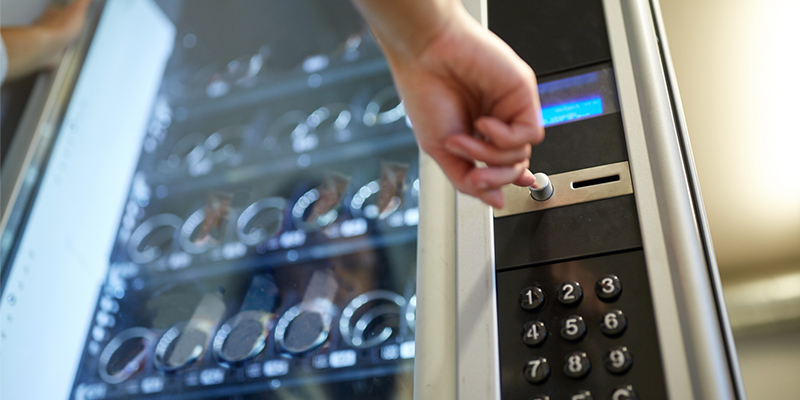UniSA makes healthy choices easier for staff and students
By Bronwyn Hurrell
 INSIDE UNISA
INSIDE UNISAStudents and staff at UniSA are being encouraged to reach for more nutritious snacks at lunchtime and between classes, under a revamp of food and drink vending machines on campus.
The number of vending machines, the way the machines are branded and the range of snacks for sale are all being overhauled to help encourage healthier eating habits.
The prominence of unhealthy food and drink options on campus has been an ongoing concern, particularly among health sciences staff.
UniSA’s Facilities Management Unit has responded to calls for healthier options by rolling out new-look vending machines in Study Period 2 of 2021. The changes include:
- The total number of vending machines on UniSA campuses being reduced by about 20 per cent.
- Colourful branding for sugary drinks and sweets will be removed from the outside of the machines.
- All food and cold beverage machines will have healthier product ranges – such as tuna, cheese, nuts and dried fruit – with some machines only offering healthier products.
- There will be no more provider branded machines, such as soft drink brands; and the range and broad accessibility of unhealthier items will be considerably reduced.
- Branding and labelling of the machines will move towards “healthy choice” messaging.
UniSA Deputy Director: Facilities Management Paul Reynolds says the University is aiming for continuous improvement through regular trialling of new healthier products to identify consumer preferences and price points.
“Our drink pricing strategy will ensure that healthy options, such as bottled water, will be the best value drink in the machine,” Reynolds says.

Nutrition and Food Sciences Program Director Dr Evangeline Mantzioris, who helped advise on the changes, has welcomed the moves.
“It is a complex balance – we need to ensure there is convenient food and drink for people working and studying on campus,” Dr Mantzioris says.
“The vending machines will offer a range of products – but we are hoping staff and students will choose the healthy products.”
Dr Mantzioris says the response to the new branding and healthier options will be the subject of further research.
“We want to see how the health and nutrition messages displayed around campus affect people’s selection of food,” she says.
The 2020 Australian of the Year Dr James Muecke AM has congratulated UniSA for its initiative.
Last year Dr Muecke approached a range of supermarkets, shops and businesses, to raise awareness about the link between vending machine ultra-processed food and sugary drinks and health issues.
“The rising tide of type 2 diabetes is a growing epidemic that is now costing our health system close to $20 billion annually,” Dr Muecke says.
“Type 2 diabetes can be avoided by reducing our intake of sugar, refined carbohydrates and highly processed foods.”
Dr Muecke says that branded vending machines and their sugary contents can be a key contributor to the problem, increasing the temptation to grab a sugar fix.
“What makes this simple preventive measure so difficult to achieve is that sugar is highly addictive – indeed it has been shown to be as addictive as nicotine.
"The actions by UniSA are brilliant news.”
Other Stories
- More sleep or more exercise: the best time trade-offs for children’s health
- Espresso, latte or decaf? Genetic code drives your desire for coffee
- More flexibility for students through plan to bring together research and teaching
- Industry goes ‘nuts’ for world-first almond grading machine
- From the Vice Chancellor
- Achievements and Announcements
- UniSA makes healthy choices easier for staff and students
- Graduate puts second chance education in focus
- Three decades at UniSA: staff member proves she’s ‘unstoppable’
- Researcher calls for change to dominant view of 'good mothering'
- Elders in Residence embedding Aboriginal knowledges and cultures at UniSA
- Bradley Building dedicated in celebration of champion of education
- Australian-first partnership helps veterans harness their health through sport
- The latest books from UniSA researchers
- In Pictures: UniSA graduations, Bradley Building dedication & school sport




